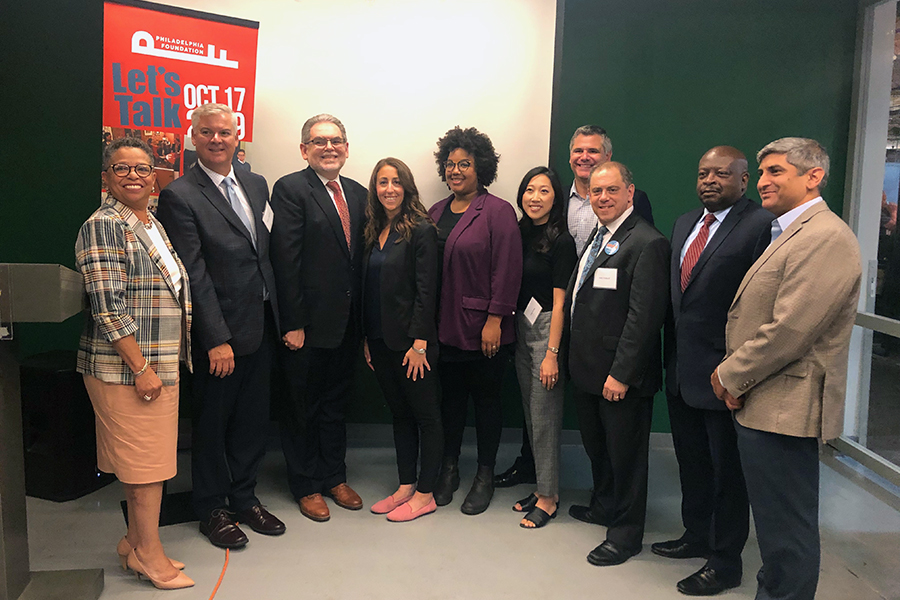A local engagement project focused on finding solutions to issues that affect diverse communities through facilitated conversations kicked off its third year on Friday.
The project centered on the Greater Philadelphia area, On the Table Philly, came from a collaboration between the Philadelphia Foundation, a philanthropic organization that provides more than 1,000 grants and scholarships annually, and the John S. and James L. Knight Foundation, a national group that invests in journalism and the arts to promote democracy.
At a Sept. 6 press conference at Reading Terminal Market, organizers said they will spend the next several weeks securing hosts and venues for Oct. 17 discussions planned across the region. That day, area residents will have the opportunity to gather in groups of 8-12 over meals at locations including community organizations, offices, libraries, recreation centers, places of worship, restaurants and homes to talk about how to make their communities stronger, safer and more supportive.
About 3,000 people participated in the inaugural 2017 campaign. It grew to 5,000 in 2018. This year’s programming will also highlight the importance of participating in the 2020 census, due to the federal survey’s impact on regional funding.
Philadelphia Foundation will provide up to $50,000 to implement ideas that come from these talks. Participants and those hosting the conversations can apply for $1,000 seed grants to launch solutions.
Last year’s mini-grants went toward executing 43 projects produced via project conversations. William Way received funding to produce short videos meant to increase the visibility of local trans leaders, particularly those of color. Another project, called “Dreams Can Become Reality,” secured cash to finance free dance classes for members of the LGBTQ-plus community, creating a safer, identity-affirming space for underserved residents.
Pedro Ramos, president and CEO of the Philadelphia Foundation, said in follow-up surveys to the 2018 project more than half of participants reported they had discussions with people whom they had not previously met. More than 75 percent indicated they were likely to act on those discussions about their ideas and passions for their communities.
Using On the Table Philly to elevate the concerns of marginalized groups, including Philadelphia’s LGBTQ community, is “embedded in” the initiative’s design, Ramos told PGN in an interview.
“We’re tapping beyond the institutions [into] individual voices, and we’re continuing to find different ways of amplifying those issues and bringing those issues to the floor,” he said. “It’s a great way to promote civic and citizen engagement. It’s also thousands of good opportunities to learn.”
The mission of the 2019 endeavor is bolstered by an advisory committee composed of partners including the City of Philadelphia, the Philadelphia Inquirer, the Free Library of Philadelphia, Visit Philadelphia, the United Way of Greater Philadelphia and Southern New Jersey, the Foundation for Delaware County and Reading Terminal Market.
Anuj Gupta, general manager of Reading Terminal Market, told reporters Friday that he is “proud” of the food hub’s participation in the initiative at a time when society is facing complex issues, like gun violence and climate change, locally, nationally and internationally.
“Unless we talk to one another, we’re not going to find any solutions,” Gupta said, adding, “On the Table has been able to demonstrate … that we do still have the ability to talk, we do have the ability to communicate over really difficult, challenging issues.”
Philadelphia Foundation is one of 11 community foundations across the United States participating in On the Table this year. The program is based on an annual civic engagement initiative of the same name that was developed by the Chicago Community Trust in 2014.
Ellen Hwang, the Philadelphia director of the Knight Foundation’s Community and National Initiatives Program, said 50,000 people across the nation have participated in On the Table during “a time when the country seems so divided.”
“We realize that one day and one conversation won’t necessarily solve all the challenges that are in a community space,” she said. “But we do believe that this one day and this one conversation can spark change.”
Fifty-eight percent of last year’s On the Table participants said the program gave them a new understanding of how to address issues facing their communities, Hwang added.
Sharmain Matlock-Turner, president and CEO of the Urban Affairs Coalition, said at Friday’s press conference that the local social change organization has participated in each cycle of On the Table Philly. In 2017, folks came together to discuss “personal experiences across the racial divide.” Last year, staff delved into the question of how to do more in the communities the group serves.
“We really need to make sure that we have places for a sounding board and a way for us to talk about important ideas past the sound bite and past just the tactical conversation,” Matlock-Turner added. “When citizens come together and talk about government, about politics and issues, I think we all learn a lot … and we are inspired to take further steps to keep this conversation going.”
